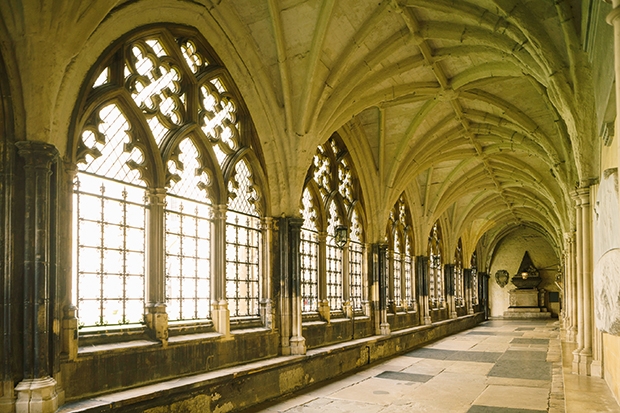As far as I know, there’s no word in the English language for feeling both terrified and smug at the same time. That’s how I felt when I gave a recent talk to my old school, Westminster, from the pulpit in Westminster Abbey. The talk was about how guilty I felt at taking the Westminster Abbey for granted when I was a boy there in the 1980s — the abbey being the school chapel. I worked out that I’d been to the abbey 400 times when I was at school. Well, to be precise, that’s 400 minus the number of times I bunked abbey — which I began to do regularly in the sixth form.
How could I have chosen not to go to one of the world’s greatest churches? I’m now obsessed with old buildings and monuments. But in my four years at the school I didn’t take in a single monument, even though my house, Dryden’s, sat in Poets’ Corner, flanked by memorials to Shakespeare, Handel, Keats and Shelley.
Nor had I noticed the school’s exceptional buildings: my day room in the early-Palladian dormitory, built by Lord Burlington in 1722; or the Norman passage that led to the school gym, where I broke my arm when I fell off a vaulting horse. Was I that short on curiosity? That self-obsessed? The funny thing, though, was that, for all the lack of curiosity, everything about the school was familiar when I went back. I may not have noticed the buildings or the monuments when I was there, but even a self-obsessed adolescent brain absorbs something of its surroundings.
Graham Greene said all the formative feelings of his life hit him before he was 21, and his novels drew only on that finite stock of feeling. In the same way, four teenage years in the same place had an eternal, elemental effect on my emotions. I took in few historical facts about the school or abbey when I was there but I retained a deep, natural attachment to both on my return. How strange to know somewhere so well, and yet know so little about it.
Despite the terror and smugness, I felt at home as I made my way through the abbey cloisters to make my grand oration. I could have done that walk blindfold. I had done it so many times before, even if it was nearly 30 years ago. The Proustian feeling was heightened by doing the walk at the same moment as I did as a child; just in time for the 9 a.m. school service. The feeling was intensified by — then as now — being surrounded by Westminster boys, also heading towards the abbey.
They seemed less bolshie than me and my contemporaries three decades ago. But, otherwise, they looked much the same: same uniform, same ties with the same house and school colours; same confident ease in the same timeless medieval surroundings. It was like being on a reality show: Back to School! Or in one of those old people’s homes where they jog the youthful memories of Alzheimer’s patients by giving the place a 1950s makeover.
Nothing had changed — except me. And that’s the essential condition of the old boy who goes back. You are Dorian Gray in reverse. The boys and girls at the school stay young for ever; only you age, become grumpier, more encrusted in your opinions, less excited by new things. The collision between your grizzled, disappointed old self and your shiny, malleable young self is too much for some old boys. They suffer from acute nostalgia in its original sense: the Greek word, ‘nostalgia’, means ‘pain in going back’.
But you only suffer from that sort of old-boy nostalgia if you had the best days of your life at school. If, like Grabber in the Molesworth books, you were ‘head of the skool captane of everything and winer of the mrs joyful prize for rafia work’, grown-up life is a bit of a comedown, particularly if you never win the grown-up prizes for rafia work.
If, like me, you had an OK time at school, but were a little bit shy and awkward, particularly with girls, then a return to school doesn’t shake you to your emotional foundations. You don’t think of grown-up life as a fall from a youthful Eden; more as a natural progression from wide-eyed, blinking, insecure childhood to cynical, knowing, insecure adulthood.
When I go back to Magdalen, my old Oxford college, I feel the same guilt at not appreciating the peerless buildings. But I also feel a secondary wave of guilt at not making more of my time there; not being more carefree; not taking full advantage of the oceans of free time in a heavenly spot with sympathetic friends.
I didn’t feel that secondary wave of guilt when I went back to Westminster. I was so young then — and essentially unformed – that it would be crazy to think such an embryonic soul could ever have fully embraced the supposed joy of youth. Adolescence is a rough old time, really, when you’re suddenly faced with a whole lot of physical, emotional and intellectual changes. You’re lucky to come out the other side relatively sane, a bit more grown-up and in possession of some decent A-levels. To ask for more is to ask to be a different person at the age of 13.
The talk in the abbey went OK; at the end, the relief from the earlier stage fright was considerable. Just before I climbed into the pulpit, my heart raced with nerves. At that moment, I looked heavenwards — less in search of God’s assistance, more to seek the consolation of fine architecture. For a brief moment, the spare beauty of Henry III’s 13th-century rib vaults killed off my nerves.
I never looked up when I was a schoolboy in the abbey. What luck to go back and get a second chance.






Comments